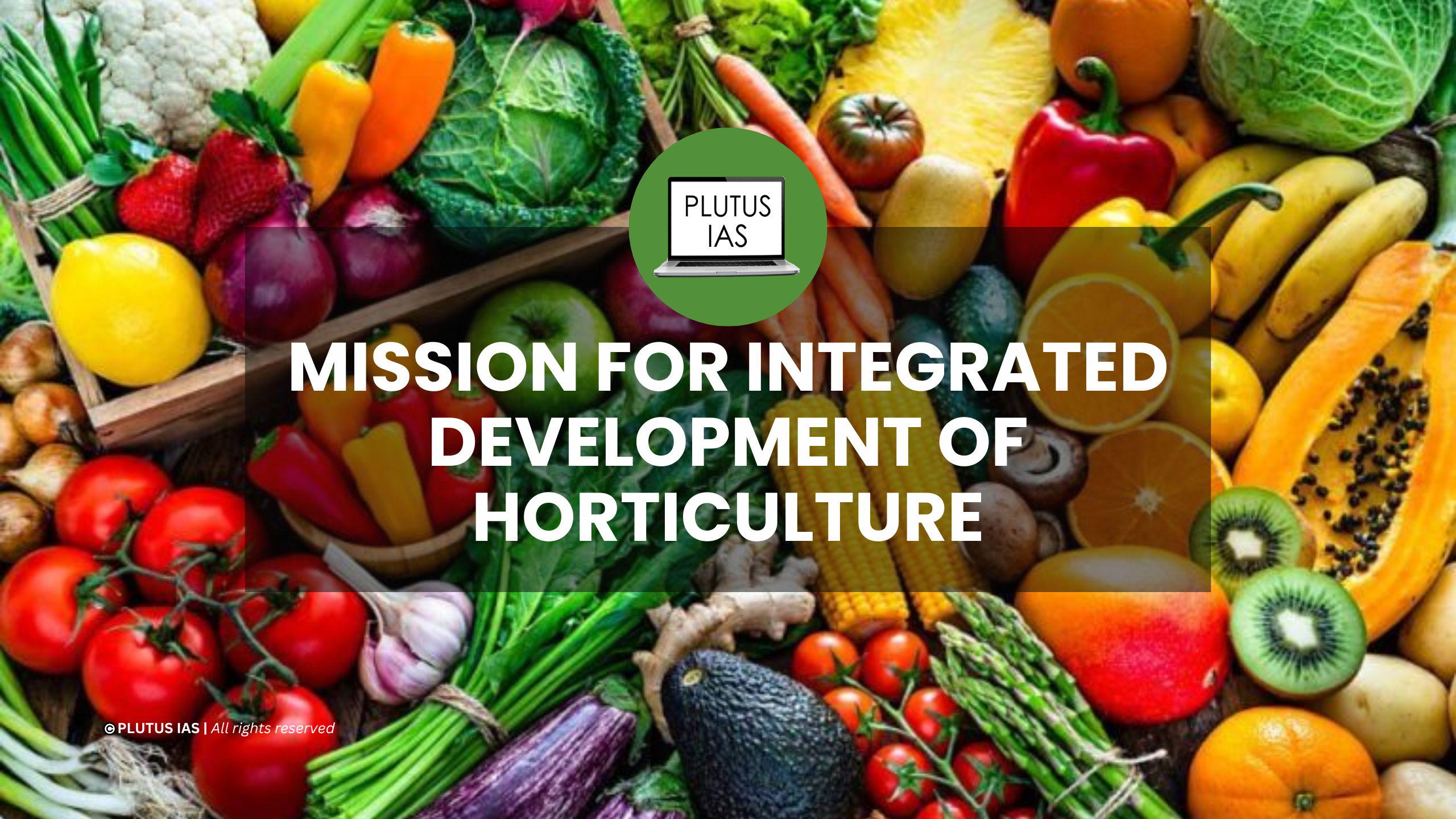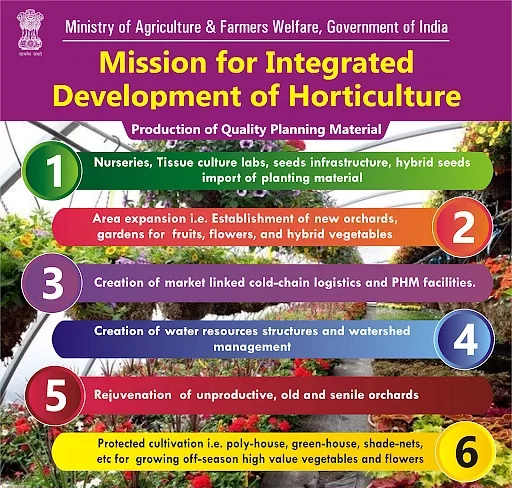14 Mar MISSION FOR INTEGRATED DEVELOPMENT OF HORTICULTURE (MIDH)
MISSION FOR INTEGRATED DEVELOPMENT OF HORTICULTURE (MIDH)
This article covers “Daily Current Affairs for UPSC” and the topic details the Mission for integrated development of the horticulture scheme.
Why in the news?

MIDH
The cultivation area of Kamalam (Dragon Fruit) is expected to expand to 50,000 hectares in five years under the MIDH scheme from the present 3,000 ha.
Under MIDH, the Ministry of Agriculture & Farmers Welfare has approved a Centre of Excellence (CoE) for Kamalam Fruit to be established by the Indian Institute of Horticultural Research (IIHR), Bengaluru to focus on production, post-harvest and value addition of Kamalam.
|
For Prelims:
For Mains: GS 2, Government Policies and Interventions for Development in various sectors and Issues arising out of their Design and Implementation.
|
What is the Mission for the integrated development of horticulture?
The Mission for Integrated Development of Horticulture (MIDH) is a centrally sponsored scheme implemented by the Ministry of Agriculture and Farmers Welfare, Government of India.
Aim of the Mission MIDH
The mission aims to promote holistic growth and development of the horticulture sector by providing support for the production, post-harvest management, and marketing of fruits, vegetables, and other horticulture crops.

Horticulture
Objectives of Horticulture Mission
The key objectives of the MIDH are:
- To enhance horticulture production and productivity through the adoption of improved technology and best practices.
- To create and strengthen infrastructure facilities for post-harvest management, storage, and processing of horticulture crops.
- To promote the development of horticulture clusters and value chains to ensure remunerative prices for farmers.
- To provide assistance for the development of market intelligence and marketing infrastructure for horticulture crops.
- To promote the establishment of plant health clinics and diagnostic services to address pest and disease problems in horticulture crops.
- To create awareness among farmers about good agricultural practices, post-harvest management, and marketing of horticulture crops.
Schemes under the Mission
Some of the key schemes under the MIDH include:
- National Horticulture Mission (NHM)
- Horticulture Cluster Development Programme (HCDP)
- Technology Mission for Integrated Development of Horticulture in North Eastern States, Sikkim, and Jammu & Kashmir
- National Bamboo Mission
- Coconut Development Board
- Mission for Integrated Development of Medicinal Plants (MIDMP)
How does the mission work?
- Financial Assistance: Financial assistance is provided to farmers, growers, and entrepreneurs for various activities such as setting up orchards, purchase of inputs, establishing post-harvest infrastructure, and marketing horticulture crops.
- Promotion of Research and Development activities: The mission also supports research and development activities to promote the adoption of new and improved varieties of horticulture crops.
Issues related to the implementation of the horticulture scheme
There are several issues that need to be addressed to ensure its effective implementation. Some of the key issues with the MIDH scheme include
- Inadequate funding: The MIDH scheme has been facing funding constraints, which have led to delays in the implementation of projects and limited outreach to farmers.
- Lack of coordination: The implementation of the MIDH scheme involves multiple stakeholders, including the central government, state governments, and various implementing agencies. However, there is often a lack of coordination among these stakeholders, leading to inefficiencies and delays in implementation.
- Limited focus on small and marginal farmers: While the MIDH scheme aims to benefit farmers across the horticulture sector, there is a limited focus on small and marginal farmers who often lack the resources to adopt new technologies and practices.
- Inadequate marketing support: The MIDH scheme provides support for the production and post-harvest management of horticulture crops, but there is a lack of focus on marketing support.
- Inefficient monitoring and evaluation: The MIDH scheme lacks a robust monitoring and evaluation mechanism, making it difficult to track the progress of projects and assess their impact. This can hinder the identification of issues and the implementation of corrective measures.
Solutions to resolve the underlying issues
- Adequate Funding: It is required for the timely and successful implementation of the projects. It will also make the coverage of the project wider with more inclusion of farmers etc.
- Streamlining of organization: There is a need to streamline and align the stakeholders to improve efficiency and reduce delays.
- Focus on small and marginal farmers: There is a need for a greater focus on resource-deprived farmers included in the mission.
- Promotion of new marketing techniques: The issue of not finding prospective sales channels arises due to the lack of marketing facilities. There is a need to promote marketing activities through training, organization of fairs, networking meets, etc.
- Raising awareness: There is a need to raise awareness of the mission so that the benefits of the mission reach the potential beneficiaries.
- Monitoring and Evaluation: There is a need for regular monitoring to avoid any kind of discrepancies in the mission. It is also needed to weed out any kind of inefficiencies lying in the system.
Overall, addressing these issues can help ensure the effective implementation of the MIDH scheme and enable it to achieve its objectives of promoting the growth and development of the horticulture sector in India.
Way Forward
Overall, the Mission for Integrated Development of Horticulture is a significant initiative aimed at promoting the growth and development of the horticulture sector in India, which has the potential to generate employment and income opportunities for farmers and contribute to the country’s food security.
Sources:
Daily Current Affairs for UPSC
For acquiring general knowledge, every UPSC aspirant should read daily current affairs for the UPSC examination. Get such kinds of the best daily current affairs for the UPSC examinations free of cost. Also, Get monthly and weekly current affairs for the IAS exam preparation.




No Comments